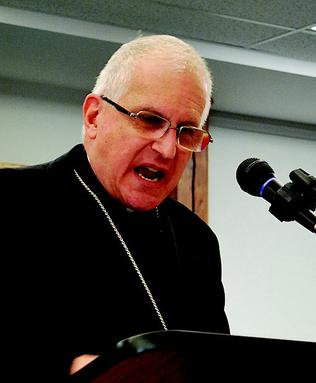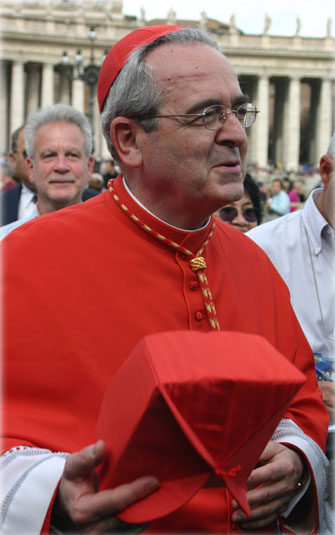Arch Conservative Bishop Resigns Under a Cloud
The megalomanic bishop of Scranton, Pennsylvania, stepped down on August 31, 2009. Even the Pope had enough. 
Ordinary Catholics had expressed their opinion on his leadership: the Diocese of Scranton’s annual fundraiser fell $274,000 short of its $5.3 million goal–the first time in the two decades since the establishment of the annual drive the diocese did not reach its goal.
Critics of the bishop’s management of the diocese – including his ongoing efforts to consolidate schools and churches – say at least part of the fundraiser’s shortfall was caused by parishioners who withheld donations out of protest.
Pope Benedict XVI accepted the resignation of Bishop Joseph F. Martino, 63, from the pastoral governance of the Diocese of Scranton for “health reasons.”
Watch a video of the press conference here.
At the press conference, Martino himself alluded to the divisions his style had brought to the diocese, and the toll it had taken on him mentally and physically: “For some time now there has not been a clear consensus among the clergy and people of the diocese of Scranton regarding my pastoral initiatives or my way of governance. This development has caused me great sorrow, resulting in bouts of insomnia and, at times, a crippling physical fatigue.”
“I seek forgiveness from anyone whm I may not have served adequately as bishop, due to my human limitations,” Martino said, adding later, “As the song says, you have to know when to hold them and when to fold them. And I think it’s time to move on.”
This controversial bishop, who gained national prominence for his strident pro-life advocacy and aggressive criticism of pro-choice Democratic politicians, was still more than a decade away from reaching the Church’s automatic retirement age of 75. Martino’s abrupt resignation, along with the fact he was not reassigned to another post within the Church–but ushered to a rural retreat center–has some church insiders suggesting that the highly unusual move was far from voluntary–and quite possibly the work of a Vatican that has been decidedly less openly critical of the Obama Administration. Church insiders also say Martino had worn out his welcome with his brother bishops in the U.S., as he began to totter dangerously over the line of separation of Church and State with his demagogue pronouncements on his Catholic teaching.
Martino’s departure came just weeks after the Archbishop of Santa Fe became the first Church leader to speak out publicly about the increasingly political behavior of a small minority of bishops within the conference. Archbishop Michael Sheehan told the National Catholic Reporter on August 12 that he spoke out during the bishops’ meeting in June, arguing that they risked “isolat(ing) ourselves from the rest of America by our strong views on abortion and the other things. We need to be building bridges, not burning them.”
From the start of his six-year tenure in Scranton, Martino alienated many with his abrasive style. He frequently clashed with the local Catholic universities–including the Jesuit-run University of Scranton–and was dismissive of their ruling bodies, arguing as bishop he would not heed their advice.
Martino seemed to take special pleasure in catigating institutions and individuals that he felt were failing to represent Catholic values.
Last February, Martino blasted another local college, Misericordia University, for inviting Keith Boykin, an openly-gay author, Clinton administration staffer and Harvard Law classmate of President Obama, to speak on campus. The university, run by the Sisters of Mercy, was “seriously failing in maintaining its Catholic identity,” Martino charged. He also sought to close down the institution’s program on diversity. 
Also in February, Martino sent a letter to the leaders of three Irish-American organizations threatening to close St. Peter’s Cathedral in Scranton during St. Patrick’s Day celebrations if groups “honor pro-abortion officials” by inviting them to speak or otherwise be honored during events in which the church might be involved. Ultimately, the Mass was held, but not before he again threatened to shut the cathedral if members of the local Catholic teachers’ union were invited to march in the St. Patrick’s Day parade. Bishop Martino refused to recognize the union.
During the 2008 presidential campaign Bishop Martino focused particular attention on vice presidental nominee Joseph Biden, the Scranton’s native son and Catholic Democrat. The bishop declared that Biden would be denied Communion if he tried to receive it at any church in the diocese, which covers the northeast corner of the state. “I will be truly vigilant on this point,” said Martino. And he warned his parishioners there would be dire consequences for supporting Biden and the Democratic ticket. In October, just prior to the election, Martino directed that a letter be read at all Sunday Masses, charging that a vote for a pro-choice politician was the same as supporting “homicide.”
Bishop Martino also called on priests and Eucharistic Ministers to act on their own to deny Communion–the central element of Catholic belief and worship–to any public officials “who persist in support for abortion and other intrinsic evils.”
One of major incidents contributing to Martino’s downfall came when he showed up unannounced as a voter-education forum at a Honesdale parish. Martino took the microphone and proceeded to criticize the organizers for discussing a comprehensive election guide, “Faithful Citizenship,” endorsed by the U.S. Conference of Catholic Bishops, instead of the letter he had drafted for the diocese on abortion.
When a nun at the forum reminded Martino that Faithful Citizenship had been prepared and endorsed by the entire bishops’ conference Martino responded, “No USCCB document is relevant in this diocese. The USCCB doesn’t speak for me,” he declared. “The only relevant document…is my letter. There is one teacher in this diocese, and these points are not debatable.”
Such comments didn’t endear him to the parishioners who organized the forum, or to his immediate superior, Philadelphia Cardinal Justin Rigali. As the head of the USCCB’s Committee on Pro-Life Activities, Rigali is just as opposed to abortion as Martino. But he is a much more politic figure. 
Many think Martino finally overstepped this spring when he started training his sights on Bob Casey, Jr., the Democratic senator from Pennsylvania and a staunchly pro-life Catholic. Casey’s late father, the former governor of Pennsylvania, is still revered by Catholics for speaking out against the Democratic Party’s support for abortion rights. Bu that didn’t stop Martino from sending Casey letters–also issued as press releases from the Diocesan office–warning the sentor that his oppostion to abortion was insufficient. In one such letter, Martino wrote that Casey “persist(s) formally in cooperating with the evil brought about by this hideous and unncessary (abortion) policy” and suggested that the senator could be denied Communion in the Scranton diocese.
The situation came to a head this spring, when King’s College in Wilkes-Barre, PA invited Senator Casey to speak at its commencement ceremony. Objecting to Casey’s vote to confirm former Kansas governor Kathleen Sebelius (a Catholic who supports abortion rights) as Secretary for Health and Human Services, Martino said it was “sad and disappointing” that the college chose to honor a Democrat who could not “muster the courage” to oppose “the pro-abortion agenda.”
Two days before Casey’s address at King’s College, Cardinal Rigali issued a statement “applauding” the senator for introducing legislation to promote policies that encourage women facing unplanned pregnancies to carry their babies to term. In the highly ritualized world of Church communication, the Cardinal’s announcement was akin to a public smackdown of Martino. One month later, Martino was summoned to Rome, and submitted his resignation. It was formally accepted in July, and he was out by the end of August.
During his farewell press conference, Martino was unapologetic. “I did what my mother told me to do,” Martino said. “She would also say, ‘Well, you do the right thing.’ And my conscience is clear.” He said he wasn’t trying to become a rallying point for the most vociferous foes of abortion, but he defended them saying they are often too readily dismissed by the media and even within the church because of their “passion.”
He praised vocal pro-lifers as “very dear to the Lord” because of their outspokenness, and said “bishops should encourage” them as they try to “overturn a profound cancer in our society, this sin, frankly, of murdering 50 million people (referring to the number of abortions since Roe v. Wade in 1973). I think we have become quite blase about that, and that scares me very much.”
“By the world’s standards perhaps I have not been successful here,” Martino concluded. “But I did what I thought was right.”
Clearly, not everyone agreed with that self-assessment.
The bishop’s high-profile controversy, and reports of low morale among the diocese’s parishioners and priests, did not go unnoticed around the country and in Rome, church observers say.
“It’s not the people who left the church that bothers Rome,” said Joseph K. Grieboski, a Scranton native and founder and president of the Washington, D.C.-based Institute on Religion and Public Policy. “It’s the people who stayed and are disaffected.
“People who are going to leave are going to leave no matter what, and the bishop became an excuse. It’s the people who stayed and said, ‘I stayed despite him,’ that’s what bothered Rome and that’s what bothered his fellow bishops.”

September 11th, 2009 at 3:44 pm
Just two observations.
While this guy is clearly off the wall, he is a product of a society which was created/imposed by the Catholic Church of his day. Blame where blame is due.
Also, on a technical point, a cardinal is not a bishop’s superior. The bishop is responsible to the Pope. However an astute cardinal, as in this case, can often get his way.
September 11th, 2009 at 9:32 pm
I am still wondering if there was more going on in addition to the very public controversies Martino was involved in. From what I know, the school issue made a lot of the area Catholics mad because they only found out their schools and churches were being closed through news articles. Martino couldn’t be bothered to tell the parishioners through announcing the closings at churches. He also fought with lay diocesan teachers who wanted to form a union (no surprise there.) I think Martino’s real beef was with Democrats in general, which was bad news for him because his diocese is a heavily Democratic area.
September 23rd, 2009 at 5:00 am
Dear Polo – thank you for correcting me.
Dear K.Huges – I personally think he stepped down because his behavior had alientated too many people in his diocese. They withdrew their support of him as their bishop.
The NE Pennslyvania area is working people and very pro-union. I think his imperial and heavy-handed treatment of people – as Catholics, as citizens, as parishioners, as adults–generally–was so abbrasive and so disrespectful he had to go. Obviously, he was so rabid he couldn’t modify his style.
And yes, he only went after Democrats. He didn’t go after Republicans on any other “Catholic value” issue–the poor, pollution, taxes, the financial system meltdown, etc.
Be well, and thanks for writing. Karen